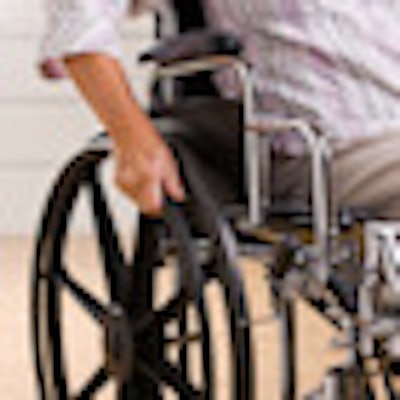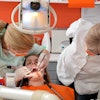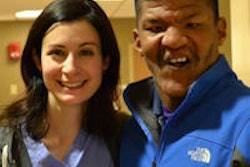
It took Michelle Hickey and her daughter Christina, both in wheelchairs, nearly six hours to get to the We Care Dental Center, but it was worth it. Most dentists had turned them away because they didn't have the thousands of dollars in down payments required for the extensive treatment they both needed.
Although they qualify for California's Denti-Cal program, it only covers extractions, not restorations.
"They'll pull our teeth out, but fillings aren't covered," Michelle, a quadriplegic, told DrBicuspid.com.
So she and her 32-year-old daughter -- who suffered a traumatic brain injury in an accident -- set out in their wheelchairs at 6:30 a.m. last week from Riverside to catch the first of many buses that would take them to the dental clinic in Rancho Mirage, a community in Southern California's high desert.
 Melvyn Glick, DDS, examines Christina Grisham. Image courtesy of Jeff Crider.
Melvyn Glick, DDS, examines Christina Grisham. Image courtesy of Jeff Crider.
"My teeth are falling out, and my daughter's teeth are turning black," Michelle said. "She brushes her teeth twice a day but has lots of cavities and barely has any teeth left."
Before her husband died, the family had great dental care. Now Michelle and her daughter depend on Medicaid and Medicare.
At We Care Dental, Melvyn Glick, DDS, co-founder of the center, examined them, took x-rays, and cleaned Christina's teeth.
"Oh, God, it means everything," Michelle said of the opportunity to finally obtain dental care for her daughter. "They were very kind and personal. I do everything I can, but I'm stuck between a rock and a hard place."
The main way we treat our patients is with kindness and love, Dr. Glick told DrBicuspid.com.
“That's what they respond to. You just need to take time with them, let them know what you're going to do, stroke them a little, talk to them a lot, have someone hold their hand if necessary, and believe me, you get results.”
Clinic beginnings
After undergoing two back surgeries, Dr. Glick retired from his Northern California practice in 2000, but he said he got bored and needed something to do. A few years ago he saw an ad for volunteers to treat people with disabilities and started using various dentists' offices before deciding to open a dedicated center.
With initial funding from Marianne and Russ Benson, who have a disabled son, We Care Dental opened in August and has provided free dental care to almost 600 patients with disabilities. The center also treats veterans and seniors on fixed incomes.
“These people have nowhere to go where they feel comfortable. They don't feel wanted.”
— Melvyn Glick, DDS
Companies, such as Patterson Dental, donate instruments and supplies. Several dentists volunteer their time, and students from Western University of Health Sciences' College of Dental Medicine in Pomona provide care under the supervision of dentists.
The ADA's Commission on Dental Accreditation recommends that students get experience treating patients with disabilities, according to Timothy Martinez, DMD, a professor and associate dean for community partnerships and access to care at Western University.
"There's so much demand to help with special needs patients," he told DrBicuspid.com.
No anesthesia
Case managers of the disabled who come to the clinic are often surprised that patients don't necessarily require oral or general anesthesia when they are treated at We Care, Dr. Martinez noted.
"They're impressed with the ability to provide dental care without compromising them medically," he said.
Angela Hastings, a third-year dental student and clinic coordinator for Western University, told DrBicuspid.com that patients can be fearful and squirm, but that when you hold their hands it calms them down. Her most challenging patient had autism and had suffered brain damage from encephalitis. The girl's mother told Hastings it was the first time she had been treated without general anesthesia.
"She was a great patient but she moved a lot," Hastings explained. "She was the trickiest to work on but definitely very rewarding."
The patients need a range of treatment: periodontal care, restorations, root canals, crowns, dentures. Many have physical limitations that make it difficult to brush their teeth.
"Now that I've worked with them I want to incorporate this population when I start practicing, especially because most dentists don't know how to handle them," Hastings said. "Knowing that you're helping a population that doesn't have access to care really feels good."
The biggest challenge is finding sufficient funds to stay open, and Dr. Glick often holds fundraisers and constantly searches for grants.
"One way or another we're going to treat them," he said. "These people have nowhere to go where they feel comfortable. They don't feel wanted. It takes a little more time perhaps, but these people come out of the chair giving us nothing but love and kisses and hugs."
He would like to see more dentists step up and volunteer to treat the poor and patients with disabilities.
"Dentists need to understand they have a responsibility to give back to the community," he said. "We've been very fortunate in what we've gained from the profession, and now it's our turn to give a little bit back."



















